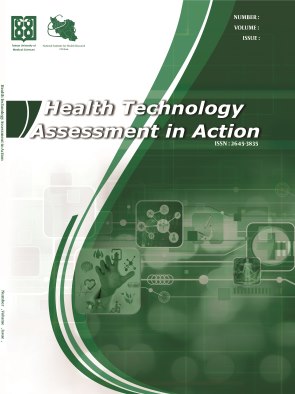E-Health Literacy: A Skill Needed in the Coronavirus Outbreak Crisis
Abstract
At present, the disease (COVID-19) is widespread throughout China and the world [1] and is a serious problem for public health and the health of people and communities. Similar to other epidemic diseases, people are intended to know the solutions to prevent and treat the disease [2]. At this time (May 2020), along with the pandemic of COVID-19, there is a need to inform and increase the awareness about this disease among different classes of people in different communities because of the lack of knowledge of the ways of prevention, control, and treatment for self-care and self-control. Controlling people is very important. People and individuals in the affected communities must learn to protect themselves from the potential risks and harms of the outbreak of this mysterious and unknown new virus. Therefore, access to health information, the messages about health education, awareness of prevention, and selecting a healthy lifestyle will assist people in coping with Coronavirus. Supporting people's access to valid health information leads to a change in the philosophy of prevention, control, inhibition, and treatment of the disease, which causes the national development of health [3]. Moreover, timely and precise information is also essential for the prevention and treatment of Coronavirus 2019 (COVID-19) for both the general public and the scientific community [4]. It is evident that a type of information tsunami is along with the outbreak of any disease, and this information is always accompanied by false information and rumors.
In social media, the phenomenon of the spread of false information and rumors is increased at every moment and progresses faster and faster, which is similar to the rapid spread of viruses in humans [5].
Currently, a great deal of information has been published on the Internet, especially on social networks, in the prevention and treatment of COVID-19. This information can sometimes be inaccurate and invalid with no scientific basis [6,7]. Therefore, this is a challenge because of affecting the people's behavior of prevention and treatment. Moreover, it increases the media's frequent exposure to incorrect information, crises, anxiety, and stress reactions among people; hence, preparing the proper information from a valid source is a significant issue in this epidemic type.
Nowadays, the Internet and web resources are frequently employed by different users such as citizens, students, and patients to search for information and make health-based decisions. The ability to discover, evaluate, and use health information on the web is affected by e-health literacy [8]. "E-health literacy" is the skill to search, find, understand, and evaluate health information from electronic information resources and employ this information to diagnose or make appropriate health-based decisions [9]. Therefore, people with e-health literacy skills use more efficient web search strategies and show a better ability to recognize high-quality health information.
With regards to the issues as mentioned above, education and information on the improvement of e-health literacy by the leading authorities such as the Ministry of Health and Medical Education and the Ministry of Education are essential and cause better control and management of the spread of false information and rumors among different classes of the community. The important issue about Coronavirus compared to similar crises is that in contrast to other crises (e.g., floods, earthquakes, explosions, and bombardment), the Coronavirus is an invisible and immeasurable crisis. Hence, it is essential to get accurate and timely information to stop the outbreak of COVID-19. The e-health literacy skills are prerequisites for obtaining precise and high-quality information about health in the information explosion and digital age.
2. Gesser-Edelsburg A, Diamant A, Hijazi R, Mesch GS. Correcting misinformation by health organizations during measles outbreaks: A controlled experiment. PloS one. 2018;13(12).
3. Adeyoyin SO, Oyewusi FO. A survey of the needs and utilization of health information among young adults in Abeokuta, Ogun state, Nigeria. Library Philosophy and Practice. 2015 Jan 1;17.
4. Hua J, Shaw R. Corona virus (Covid-19)“infodemic” and emerging issues through a data lens: The case of china. International journal of environmental research and public health. 2020 Jan;17(7):2309.
5. Hua J, Shaw R. Corona virus (Covid-19)“infodemic” and emerging issues through a data lens: The case of china. International journal of environmental research and public health. 2020 Jan;17(7):2309.
6. Bastani P, Bahrami MA. COVID-19 Related Misinformation on Social Media: A Qualitative Study from Iran. Journal Of Medical Internet Research. 2020 Apr 5.
7. Hernández-García I, Giménez-Júlvez T. Assessment of health information about COVID-19 prevention on the internet: infodemiological study. JMIR Public Health and Surveillance. 2020;6(2):e18717.
8. Quinn S, Bond R, Nugent C. Quantifying health literacy and eHealth literacy using existing instruments and browser-based software for tracking online health information seeking behavior. Computers in Human Behavior. 2017;69:256-67
9. Norman C. eHealth literacy 2.0: problems and opportunities with an evolving concept. Journal of medical Internet research. 2011;13(4):e125.
| Files | ||
| Issue | Vol 4, No 1 (2020) | |
| Section | Editorial | |
| DOI | https://doi.org/10.18502/htaa.v4i1.5861 | |
| Keywords | ||
| No Keyword No Keywords No Keyword | ||
| Rights and permissions | |

|
This work is licensed under a Creative Commons Attribution-NonCommercial 4.0 International License. |




